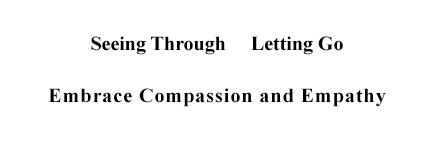Having introduced the doctrine of Such is the Way of Dharam and its two eternal realms, this post discusses the fundamental difference in their existence. Buddha teaches that while one realm exists unconditionally, the other exists conditionally.
Sandhinirmocana Sutra (Chinese=解深密經) “is a Mahāyāna Buddhist text and the most important sutra of the Yogācāra school. It contains explanations of key Yogācāra concepts such as the basal-consciousness (ālaya-vijñāna), the doctrine of appearance-only (vijñapti-mātra), and the “three own natures” (trisvabhāva). It is “one of the most important texts of the Yogācāra tradition…..The sūtra presents itself as a series of dialogues between Gautama Buddha and various bodhisattvas. During these dialogues, the Buddha attempts to clarify disputed meanings present in scriptures of the early Mahāyāna and the early Buddhist schools; thus, the title of the sūtra, which promises to expound a teaching that is “completely explicit” and requires no interpretation in order to be understood.“
In the Sandhinirmocana Sutra, Buddha teaches that “there are two types of dharma, one conditioned, and the other unconditioned (Chinese=一切法者,略有二種,一者有為,二者無為.)”
But first, let’s begin by defining the meaning of condition.
Condition (Romanized Sanskrit=pratyaya; Chinese=緣), according to The Princeton Dictionary of Buddhism, refers “to the subsidiary factors whose concomitance results in the production of an effect from a cause.” “For example, in the production of a sprout from a seed, the seed would be the cause (Hetu), while such factors as heat and moisture would be conditions (pratyaya.).”
A) Conditioned dharma (Sanskrit=samskrtadharma), according to The Princeton Dictionary of Buddhism, is “a term that describes all impermanent phenomena, that is, “all phenomena that are produced through the concomitance of causes and conditions.” Furthermore, “Buddha is said to have taught: When this is present, that comes to be, / From the arising of this, that arises. / When this is absent, that does not come to be. / From the cessation of this, that ceases.”
Conditioned phenomena are usually assigned to everything in the universe. While it is not wrong, conditioned phenomena started before our universe and have existed eternally since immemorial. However, our conditioned universe did originate from this eternal realm when conditions were right.
In the days of atomic theory, scientists explained the conditional existence of all phenomena by telling us that everything consists of atoms and molecules. Atoms are further dependent on their electrons, neutrons, and protons for existence. With the advent of quantum mechanics, the conditional existence of all phenomena has moved to the quantum realm in a phenomenon scientists call the central mystery of quantum mechanics.
The central mystery states that “everything in the universe, from light to electrons to atoms, behaves like both a particle and a wave at the same time. According to Dr. Frank Wiczek, a Nobel Prize-winning quantum scientist, quantum scientists no longer consider particle phenomena. Instead, they consider particles epiphenomena, ripples in the fluctuating quantum energy field. In other words, the existence of particles is conditionally dependent on the fluctuation of the quantum field.
If one substitutes “this” in Buddha’s statement with “the fluctuating quantum energy field” from quantum mechanics and “that” with “particle,” then it becomes the following statement that shows the teachings in quantum mechanics can explain Buddha’s teaching on conditionality perfectly:
“When the fluctuating quantum energy field is present, particles come to be, / From the arising of the fluctuating quantum energy field, particles arise. / When the the fluctuating quantum field is absent, particles do not come to be. / From the cessation of the fluctuating quantum energy field, particles cease.”
B) Unconditioned dharma (Romanized Sansrkrit=asamskrtadharma; (Chinese=無為法), according to The Princeton Dictionary of Buddhism, “is “in Sanskrit, (also called) “uncompounded,” …. not conditioned and therefore perduring phenomena that are not subject to impermanence.”
Unconditioned dharma does not exist in the universe. Traditionally, unconditional existence has belonged to the domains of religions or philosophical thoughts. Many deities in religions worldwide are deemed to exist unconditionally and permanently. In philosophy, philosopher Immanuel Kant postulated the realm of Noumenon, which exists unconditionally as a “thing-in-itself” outside of human perception, in contrast to the phenomenal world.
In Buddhism, however, the unconditioned realm belongs to the Ultimate Reality, which is directly verifiable and exists in a realm separate from the universe.


